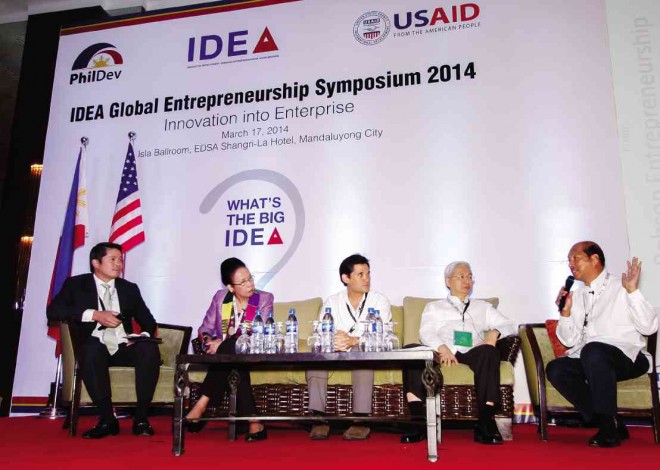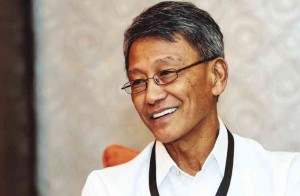Engineering students should learn entrepreneurship

IDEA MEN (From left) Manny Ayala, founder of Hatchd Inc.; UP president Alfredo Pascual and Budget Secretary Florencio B. Abad
MANILA, Philippines—Silicon Valley visionary Diosdado “Dado” Banatao says the country needs to develop engineering students into innovators and entrepreneurs like those in the billion-dollar technology companies in Silicon Valley in California.
Banatao, who obtained Master’s degrees in Electrical Engineering and Computer Science at Stanford University, suggests a shift from theory-based science and engineering education to practice-based learning.
Engineering students in Philippine universities are not trained to design products, says Banatao, chair of the Philippine Development Foundation (PhilDev).
With the support of the United States Agency International Development, PhilDev has launched a three-year program called Innovative Development through Entrepreneurship Acceleration (IDEA) that aims to create an engineering-entrepreneurship curriculum and promote a market-led economic development.
It has partnered with the academe, private sector and key government agencies to ensure effective implementation.
“We need to start a foundation for innovation,” Banatao told students, educators, government officials, lawmakers, diplomats and businessmen at the recent IDEA Global Entrepreneurship symposium at Edsa Shangri-La hotel.
Banatao said learning mathematics and physics was good but students should also know how to turn concepts and theories into design.
“Engineers are trained to create,” said Banatao, who developed several key semiconductor technologies including the world’s first single chip for personal computers.
To be globally competitive, “you better be able to design something,” he said in an interview.
Banatao said that while college dropouts Steve Jobs, Mark Zuckerberg and Bill Gates did the initial thinking and technical work for Apple, Facebook and Microsoft respectively, they eventually had to hire “real technology experts.”
Thousands of “sharp engineers,” the Cagayan Valley native said, were behind the success of the trailblazing companies.
“Education matters,” he stressed. “The founder alone does not make the company. Can you imagine a Microsoft that’s only Bill Gates? … At the end of the day, it was the sharp engineers who did it.”
He noted that investors in the Philippines put their money in secure investments, like real estate and shopping malls. Only a few financed innovations.
This was due “to the way universities teach engineering,” said Banatao, who is also the managing partner of Tallwood Venture Capital.
“We need to create some really good engineers,” he emphasized. “We need to demand quality from engineering schools.”
New challenge
Commission on Higher Education (CHEd) Chair Patricia Licuanan, the keynote speaker, said integrating entrepreneurship in science and technology (S&T) was a new challenge.
“What can higher education do to produce scientist entrepreneurs or ‘technopreneurs?’” Licuanan asked.
The CHEd formed a technical panel composed of scientists, engineers and business people to brainstorm on this, she said.
The first option considered by the panel was to enhance the entrepreneurship program by including S&T electives, Licuanan said. The second was to institutionalize an entrepreneurial approach to S&T by adding business courses to the curriculum.
Licuanan said there were reservations about the second because most higher education institutions were not providing the science education needed for national development.
A hybrid program combining science and entrepreneurship was also proposed. “The objective of the program would be to create an environment and a culture that would produce a new breed of science and technology entrepreneurs,” she said.
The “ambitious program” would not be placed under the College of Engineering or College of Business Administration, Licuanan said. Another suggestion was to make it a postgraduate course.
Francisco “Paco” Sandejas of Narra Venture Capital said PhilDev had been focusing on education, the human capital aspect, when culture was just as important.
Highly trained engineers would end up in multinational companies if they were not “entrepreneurial,” Sandejas said.
University of the Philippines president Alfredo Pascual said that in the academe, “failure is taboo … [a] thinking embedded in the way college students are trained … Students are always told to excel, get high grades.”
Failure is considered an advantage in Silicon Valley, Banatao said. “We like it if you’ve failed because you really learned hard. Those are the things you don’t forget.”
The electrical engineering graduate from Mapua Institute of Technology said the country had the potential to make it big in the sci-tech world.
To jump-start his ambitions for the Philippines, Banatao, a firm believer in education, started PhilDev and other scholarship programs.
















